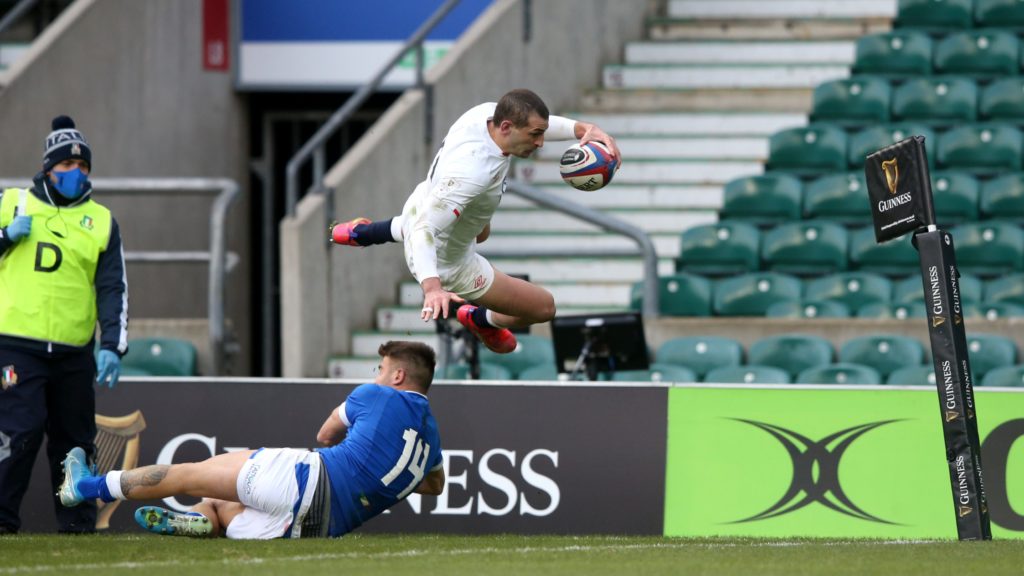Nigel Owens and Jonathan Kaplan have differing views as to whether England wing Jonny May’s acrobatic try against Italy should have been awarded.
May produced an incredible finish when he dove into the air and over the tryline to score, putting England 20-8 ahead at half time, in a game Eddie Jones’ team would go on to win 41-18.
The wing’s finish earned him plenty of plaudits, but it was also debated as to whether he should have been penalised for essentially jumping into the tackle.
Former Scotland lock Jim Hamilton opined on social media that May should not have been allowed to jump over the attempted tackle from the covering Italian defender.
You can’t jump over a tackler. Been a very poor match for the officials, unfortunately. https://t.co/hwT6qUIdiK
— Jim (@jimhamilton4) February 13, 2021
Commenting on Hamilton’s tweet, former Test referee Nigel Owens said that he was ‘spot on’ and that May should have been penalised by infringing the laws of jumping into or over a tackler.
Your spot on Jim, you can’t jump to avoid a tackle like that. We will make a ref of you soon ??
— Nigel Owens MBE (@Nigelrefowens) February 13, 2021
Should be pK he jumps up to avoid tackle that’s not a dive for the line
— Nigel Owens MBE (@Nigelrefowens) February 13, 2021
Thats is the decision given on the day yes. But it will be reviewed as part of the reviewing process and if they have it wrong then that will be in their feedback. my view is that it’s a penalty and it’s not diving for the line but jumping to avoid tackle .
— Nigel Owens MBE (@Nigelrefowens) February 14, 2021
— Hamish Scott (@hamishfs) February 15, 2021
However, Kaplan, who was previously the most experienced Test referee of all time before Owens broke the record, gave a different view.
Writing in the match review for Telegraph Sport, Kaplan opined that there was nothing wrong with May’s finish and that disallowing the try would be a further sign of the game’s oversanitation.
‘There were some suggestions on social media that Jonny May’s try should have been disallowed for jumping out of the tackle,’ Kaplan wrote. ‘I’m afraid I don’t see any issue – this was a brilliant finish that was quite rightly awarded.
‘May improvised with a finish straight out of rugby league, and sometimes you have no choice but to take to the air to score a try. If we disallowed it [and I have no idea under which law you would do so] then we would be oversanitising the game and you run the risk of having to rule out a try every time a player dives for the line, which is clearly ridiculous.
‘In the same breath, if Luca Sperandio had made the tackle then that would have been fine as well – I don’t see it as taking a player out in the air. If a player jumps up in the act of diving to score, I would imagine a common-sense approach would prevail in allowing a defender to actually defend. It was a super score that was correctly given.’
Photo: Getty Images





